News
2025-6-19
On Tuesday, June 19, 2025, the Researcher Presentations for the Eighth-term Class were held in Conference Room 2 on the third floor of the Main Building at the Ookayama Campus.
The event aimed to help Academy members deepen their understanding of one another’s research and strengthen communication. In a setting where researchers from diverse fields come together, it is important to clearly communicate one’s research to non-specialists and to engage in constructive discussion by grasping the intent behind others’ presentations.
With this in mind, each Academy member gave a presentation designed to be accessible to those outside their field. Each talk was allotted 7 minutes, followed by a 13-minute Q&A session.
All 11 members participated and listened attentively to presentations beyond their own areas of expertise. Over 90 questions were exchanged, covering topics such as research content, methodology, and goals. Discussions continued during breaks, and the relaxed atmosphere—unlike that of formal academic conferences—fostered deeper communication among the members, making the event especially meaningful.


2025-6-6
Orientation for the Comprehensive Academy's Eighth-term Class of 2025
The Comprehensive Academy held its orientation for the Eighth-term Class on June 6, 2025, in Conference Room 1 of the Main Building at the Ookayama Campus.
This year, 11 new members joined the Comprehensive Academy, bringing the total to 116. Nine members attended the session and received their admission certificates.
Before the orientation, Naoto Ohtake, President of the Institute of Science Tokyo and Honorary Headmaster of the Comprehensive Academy, gave a message of encouragement to the new members.
Message from Honorary Headmaster Ohtake:
In reference to the recent visit to the Center for Fundamental Research by Toshiko Abe, Minister of Education, Culture, Sports, Science and Technology (MEXT), and her discussion with early-career researchers, Mr. Ohtake shared the following thoughts:
“It is important to consider how young researchers can aim high and reach the ‘Clouds Above the Hill.’
While immediate goals—such as securing next year’s Grant-in-Aid for Scientific Research or publishing several papers within five years—are real, we all sense that short-term thinking alone does not lead to major success.
What truly matters is having a clear vision of what you want to achieve in 10 or 20 years—a broad and meaningful research theme. That theme will shape your short-term work as well.
At the Center for Fundamental Research, we especially want you to focus on identifying your own theme.
A key feature this year is that members from both the Medical and Dental Sciences and the Science and Engineering fields are participating together.
Though the program lasts only three months, I hope you will engage with researchers from different disciplines, build bridges across fields, and nurture new research ideas on those bridges.”

Orientation Program:
- ・Staff introductions
- ・Purpose of the Comprehensive Academy (Director Shishido)
- ・Certificate presentation (Headmaster Akita)
- ・Introductions by Academy members
- ・Overview of Academy activities (Headmaster Akita)
- ・Q&A session
The Comprehensive Academy provides a three-month period for focused research in a relaxed and different setting.
It is not aimed at immediate research output. Rather, it provides a space to explore long-term research themes that may take years to develop and may lead to interdisciplinary collaboration in the future.
Through the program, members are encouraged to find like-minded peers, engage in stimulating dialogue, and build meaningful research experiences while enjoying the process.
After the session, members had time for informal conversation and networking.
For the two members unable to attend, individual sessions were held later to provide an overview and present them with their admission certificates.
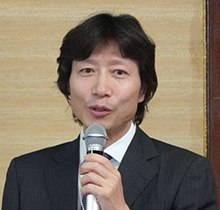
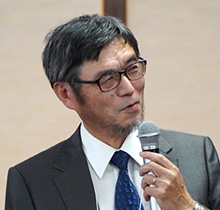


2025-3-19
The 11th Meeting of the Specialized Academy for Cell Science
On March 19, 2025, the Specialized Academy for Cell Science held the following discussion meeting:
1. Overseas Research Report – Dr. Tsukumi Miwa
2. Discussion Meeting – Dr. Masayuki Murata, "Transforming Drug Discovery and Cellular Medicine with Imaging"
Dr. Tsukumi Miwa’s Overseas Research Report
Dr. Miwa presented a report on her research stay at Professor Johannes Buchner’s laboratory at the Technical University of Munich, Germany. This research stay was supported by the Specialized Academy for Cell Science.
At the beginning of her talk, she explained how she decided to pursue this research stay, highlighting the crucial role that advice from faculty mentors and colleagues played in her decision. During her stay, she conducted analyses using cryo-electron microscopy, which allowed her to engage in a short but intensive and fruitful research experience.
She also shared that, before departing, she was initially concerned about living in a foreign country. However, upon arrival, she found it to be a welcoming and comfortable environment, with the host laboratory members warmly receiving her. Having long sought an opportunity for an extended research stay abroad, Dr. Miwa has now decided to pursue a long-term stay at the same laboratory in the future.

Dr. Masayuki Murata’s Lecture
Dr. Murata delivered a lecture titled "Transforming Drug Discovery and Cellular Medicine with Imaging."
In the first half of the lecture, he provided an academic explanation of the PLOM-CON analysis method, which he developed. In the second half, he shared his research journey, tracing the background that led to the development of this technology.
Dr. Murata earned his degree from Dr. Shun-ichi Onishi’s laboratory at Kyoto University. He then conducted research as an international research fellow at the laboratories of Kai Simons and Randy Schekman. During this time, he conceived a technique to link molecular information with morphological information.
After returning to Japan, he worked at Kyoto University before being appointed as an associate professor at Dr. Kuniaki Nagayama’s laboratory at the National Institute for Physiological Sciences. There, he successfully co-developed the semi-intact cell system with Dr. Kano. Later, he established his own laboratory at the College of Arts and Sciences, the University of Tokyo, while also serving as a specially appointed professor at Tokyo Institute of Technology.
Dr. Murata also shared a memorable story about his dramatic reunion with Dr. Osumi when he joined Tokyo Institute of Technology. He emphasized how various personal and professional encounters played a pivotal role in advancing his research. His lecture provided invaluable insights for seminar students as they plan their future research careers.
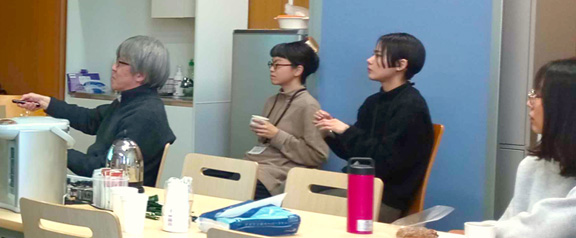
2025-2-6
Appointment of New Academy Scholars
A ceremony was held on February 6, 2025 for the presentation of certificates of appointment for members of the Specialized Academy for Cell Science. Dr. Yoshinori Ohsumi, the Headmaster, handed the certificates to the members with words of encouragement.
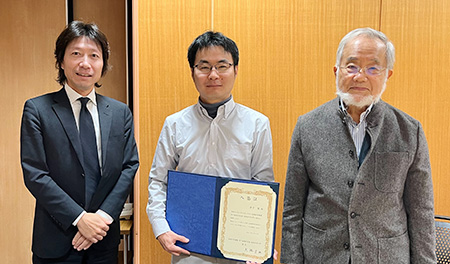
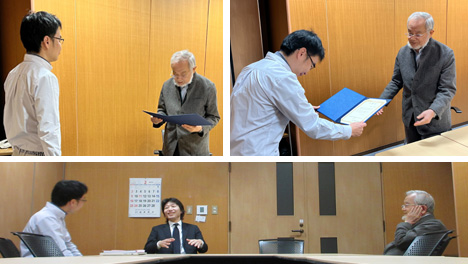
Satoru IDE, Asst. Prof.
2025-1-11
The 25th Interactive Seminar of specialized academy of organic chemistry (Suzuki Juku)
As a regular seminar series of Specialized Academy of Organic Chemistry (Suzuki-juku), the 25th interactive seminar was held online with the attendance of 20 participants on January 11, 2025.
Speaker: Prof. Emeritus Takeshi Sugai (Keio Univeresity)
Title: "Tortoise and Hare Stories of Aesop's Fables in Enzyme-catalyzed Kinetic Resolution"
Dr. Takeshi Sugai introduced separation of enantiomers by enzymatic reactions. His talk started with the theoretical backgrounds and the practical techniques, that maximize the performance of the enantio-separation process. Among the relevant parameters for discriminating the fast (hare) enantiomer and the slow (tortoise) enantiomers, the Vmax (kcat) that allows the complete escape for hare is of utmost importance, for which the substrate structure as well as the reaction conditions should thoroughly be elaborated. Finding out the proper enzymes, synergistically effective are docking simulation, information from databases, and experiences.
2024-12-14
The 24th Interactive Seminar of specialized academy of organic chemistry (Suzuki Juku)
As a regular seminar series of Specialized Academy of Organic Chemistry (Suzuki-juku), the 24th interactive seminar was held online with the attendance of 18 participants on December 14, 2024.
Speaker: Prof. Tomoko Yajima (Ochanomizu Univeresity)
Title: "Visiblelight-induced perfluoroalkylayion using organocatalyst"
Prof. Yajima gave a talk on her studies on visible light induced reactions. These reactions have been actively studied in recent years, but most of them use ruthenium or iridium catalyst. In this seminar, she presented the recent results of metal-free visible light fluoroalkylation reactions. The first half focused on reactions using Eosin Y, an inexpensive and readily available organic dye, as a redox catalyst, while the second half focused on visible light reactions using cheaper and simpler amines as catalysts.
2024-10-5
The 23rd Interactive Seminar of specialized academy of organic chemistry (Suzuki Juku)
As a regular seminar series of Specialized Academy of Organic Chemistry (Suzuki-juku), the 23rd interactive seminar was held online with the attendance of 18 participants on October 5, 2024.
Speaker: Prof. Fumitaka Kudo (Institute of Science Tokyo)
Title: "HAT (Hydrogen Atom Transfer) Chemistry in Natural Product Biosynthesis"
Prof. Kudo gave a talk on his studies on enzymes in natural product biosynthesis that catalyze hydrogen atom transfer (HAT).
1) Aminocyclitol antibiotics: Identification and enzymatic analysis of a radical S-adenosyl-L-methionine (SAM) epimerase, including EPR analysis to detect the key radical intermediate.
2) 1-Amino-2-methylcyclopropanecarboxylic acid: Functional analysis of a cobalamin-dependent SAM C-methyltransferase followed by subsequent cyclopropanecarboxylic acid synthase.
3) Bacteriohopantetrol cyclitol ether: Two radical SAM enzymes responsible for the deoxyadenosylation and the sugar ring contraction.

2024-8-31
The 22nd Interactive Seminar of specialized academy of organic chemistry (Suzuki Juku)
As a regular seminar series of Specialized Academy of Organic Chemistry (Suzuki-juku), the 22nd interactive seminar was held online with the attendance of 15 participants on August 31, 2024.
Speaker: Prof. Junji Ichikawa (Tsukuba University, Sagami Chemical Research Institute)
Title: "Construction of Fluorine-Containing 5-Membered HeterocyclesUsing the Properties of Fluorine Substituents"
Prof. Ichikawa gave a talk on the synthetic methods of organofluorine compounds. Particular attention was laid on the synthetic methods of ring-fluorinated 5-membered heterocycles, which were based on i) 5-endo-trig cyclizations or ii) [4+1] annulations. These methods fully exploited special, interesting properties of the fluorine substituents.
2024-7-25
Appointment of New Academy Scholars
A ceremony was held on July 25, 2024 for the presentation of certificates of appointment for members of the Specialized Academy for Cell Science. Dr. Yoshinori Ohsumi, the Headmaster, handed the certificates to the members with words of encouragement.
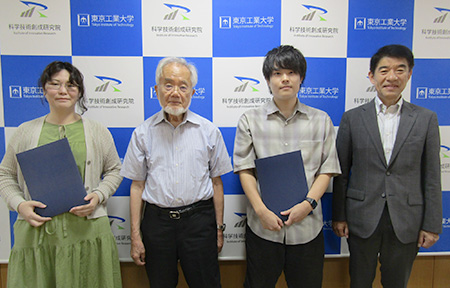
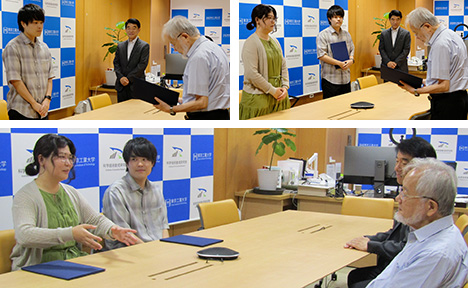
Mika SAOTOME, Post Doc. , Goki TANIGUCHI, Post Doc.
2024-6-25
Researcher Presentations for the Seven-term Comprehensive Academy Class of 2024
On Tuesday, June 25, 2024, the Comprehensive Academy held the Researcher Presentations for the 2024 Seven-term Class in the main conference room on the 19th floor of the J2 and J3 Buildings at Suzukakedai Campus. Twelve academy members participated, with one joining online.
The purpose of the Researcher Presentations is for academy members to enhance communication by introducing each other’s research. Interdisciplinary communication is difficult for speakers as it can be challenging to introduce research interests and opinions to a non-specialist audience. The audience, too, must engage with and understand the speaker's words and area of expertise before they are able to voice an opinion about the work.
Therefore, during this presentation, each academy member was given seven minutes to clearly explain their research topic to those outside their field, with an additional 13 minutes allocated for questions and answers.
All participating academy members actively listened to presentations outside their own fields of expertise. The Q&A session became very lively, with over 100 questions asked, making it an event that greatly deepened the understanding among the academy members.
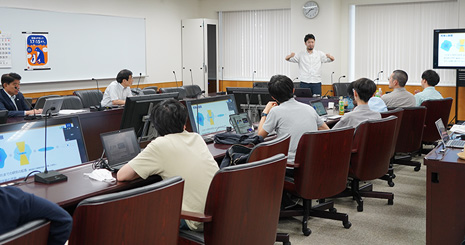
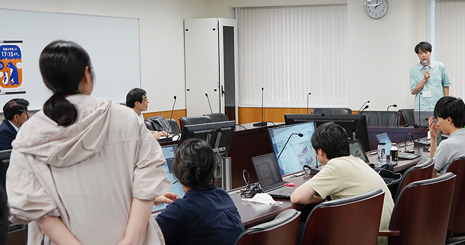
2024-6-7
Orientation for the Comprehensive Academy's Seven-term Class of 2024
The Comprehensive Academy held its orientation for the 2024 Seven-term Class on June 7, 2024, in the Main Building’s Conference Room 1 on the Ookayama Campus. This year, we welcomed 12 new members, bringing the total number of members to 105. Nine members participated in the orientation, where they received their admission certificates. After the orientation, we had a socializing session for about 30 minutes to facilitate interaction among the members. The three members who could not attend were briefed individually later, during which they also received their admission certificates.
- - Introduction of Comprehensive Academy staff
- - An outline of the purpose and activities of the Comprehensive Academy by Director Ohtake
- - A presentation on admission certificates by Headmaster Ohtake
- - A self-introduction session for all academy members
- - An explanation of both the program schedule and individual interviews by Associate Director Inou
- - A research harassment and research ethics by Associate Director Inou
- - Explanation of signing a pledge by Associate Director Inou
- - A talk about effective presentation methods by Associate Director Inou
- - A Q&A session
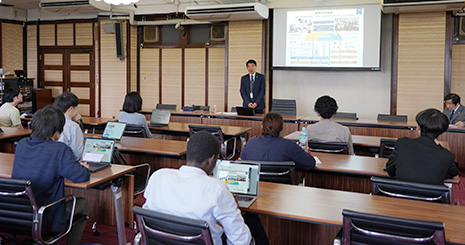
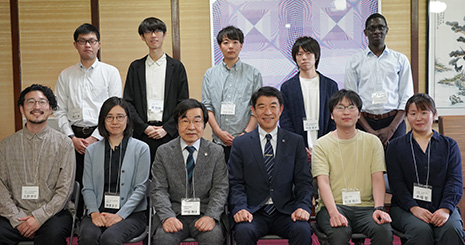
Purpose of the Comprehensive Academy (Naoto Ohtake, Director)
First, let me explain the background of the establishment of the Organization for Fundamental Research. When the Tokyo Institute of Technology was designated as a Designated National University in 2017, it aimed to create an environment where early-career researchers could dedicate themselves to fundamental research. To foster the young researchers who will lead in 20 years, we seriously considered what kind of support we should provide. The Comprehensive Academy was founded to give researchers time to think about their research themes.
Setting an appropriate research theme is crucial for influencing the acceptance rate of the Grant-in-Aid for Scientific Research. Finding a lifelong research theme is also important, but in reality, there is often not enough time for this. Through three months of activities, we hope that you will discover alternative themes outside of your specialized fields and find themes that you can be passionate about for decades. To support the themes you develop, the Comprehensive Academy offers the Grant-in-Aid for Challenging Research. For graduates, we have the Grant-in-Aid for Pioneering Research, providing long-term research support.
The activities at the Comprehensive Academy include events like meetings with Dr. Yoshinori Ohsumi, discussions with members from different research fields, and exchanges with Tokyo Medical and Dental University. These activities are characterized by supporting a wide range of fundamental research without limiting it to specific fields. Please cherish the connections you build in this community outside of your labs and support each other as comrades.
Lastly, with the university merger scheduled for October, we would like to hear the opinions of early-career researchers. If you have any concerns or expectations, please share them frankly. We will make every effort to create an environment that respects your opinions. We sincerely look forward to your success.
Research Harassment and Research Ethics (Norio Inou, Associate Director)
In the research field, issues of power harassment and academic harassment are unavoidable. This includes harassment from superiors as well as subordinates. During my active years, I served as a counselor at the Student Counseling Office and realized that perceptions of harassment have changed over time. Since individual perceptions vary, it is important to be mindful of how we communicate. Ensure opportunities for real conversations and be cautious of communication mismatches while conducting research. Additionally, please read the leaflets and guidelines provided for students to prevent mismatches related to harassment.
Research ethics is a critical aspect necessary for the smooth conduct of research. There are several points to confirm and adhere to before, during, and after conducting research. The rules on research ethics are periodically reviewed and tightened, so it is important to always check the latest information. Export control for security is increasingly important recently, and it is essential to manage conflicts of interest clearly as you proceed with your research.
The grants provided by the Comprehensive Academy are intended to be effectively used for research activities not covered by Grant-in-Aid for Scientific Research or external funds. However, misconduct is absolutely unacceptable. Please ensure proper execution based on the rules.
2024-5-12
Challenging Research by Young Researchers from the Organization for Fundamental Research
The Organization for Fundamental Research (CFR) held "Introduction of Challenging Research performed by Young Researchers" as a lecture event of SUZUKAKE SCIENCE DAY 2024 on Sunday, May 12.
This is the third time that this lecture has been planned with the aim of introducing to society at large the challenging research being undertaken by young researchers.
The event was held in a hybrid style of lecture hall at Suzukakedai Campus S8 Bldg. and online delivery, with 96 participants (67 in hall / 29 online).
Lecture Program
Moderator: Norio Inou, Associate Director, Organization for Fundamental Research
- 1.Introduction to the Organization for Fundamental Research
Naoto Ohtake, Director, Organization for Fundamental Research - 2.The Art of Cell Design
Rina Kunishige, Affiliate of the Cell Biology Center and Organization for Fundamental Research, Institute of Innovative Research - 3.Mystery of the universe and particle physics probing through big data
Kazuki Todome, sixth cohort of the Comprehensive Academy, Department of Physics, School of Science - 4.Biofilms and polysaccharides of microalgae
Kaisei Maeda, sixth cohort of the Comprehensive Academy, Institute of Chemistry and Life Science, Institute of Innovative Research - 5.Architecture supports Humans
Yutaro Fujii, fifth cohort of the Comprehensive Academy, Department of Architecture and Building Engineering, School of Environment and Society
There were presentations from four speakers, each designed to be enjoyable for everyone. During the Q&A session with the participants, the discussion covered a wide range of topics, including not only the specifics of individual research but also how people outside academia can engage in basic research, methods for publishing papers in large collaborative research projects, and more. We believe it provided a valuable opportunity for attendees to feel more connected to the cutting-edge research being conducted at Tokyo Institute of Technology.
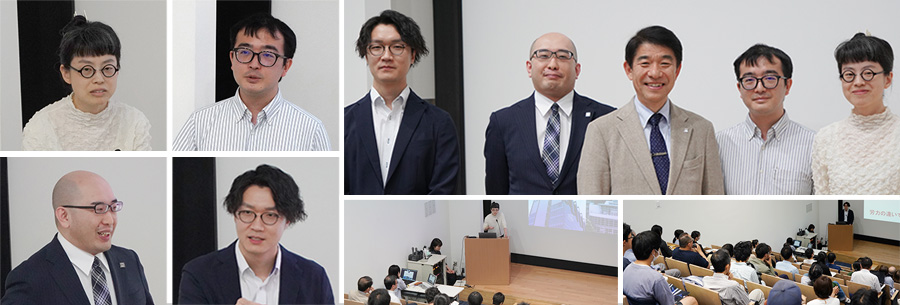
2024-4-23
Appointment of New Academy Scholars
A ceremony was held on April 23, 2024 for the presentation of certificates of appointment for members of the Specialized Academy for Cell Science. Dr. Yoshinori Ohsumi, the Headmaster, handed the certificates to the members with words of encouragement.
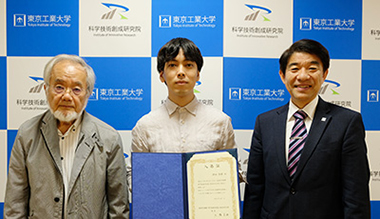
Assistant Prof.Keisuke MOCHIDA
2024-4-19
Challenging Research by Young Researchers from the Organization for Fundamental Research
The Organization for Fundamental Research was established in July 2018 as a place to train fundamental research specialists who will support future academia.In this lecture, four junior faculty members will discuss their current research in an easy-to-understand manner and explain their future prospects. They include Specially Appointed Assistant Professor Rina Kunishige (a Specialized Academy participant), as well as Assistant Professors Kazuki Todome, Kaisei Maeda, and Yutaro Fujii (all graduates of the Comprehensive Academy).
Sunday, May 12, 12:30 p.m. – 2:00 p.m.
Online and in person at Tokyo Tech Suzukakedai Campus
>2018.7~2019 News | >2020~2021 News | >2022~2023 News | >Latest News

